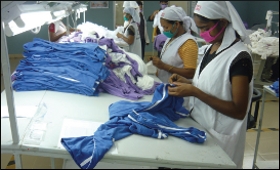|

|
Apparel exporters puts forth concerns before Parl Committee
|
|

|
|
| Top Stories |
 |
|
|
|
Saurabh Gupta | 30 Oct, 2017
Apex apparel body, AEPC has made a point wise presentation to the Parliamentary Standing Committee on the impact of GST on Apparel Exports, informed Apparel Export Promotion Council (AEPC) in a press release.
In its presentation to Naresh Gujral, Chairman, Parliamentary Standing Committees (RS) on Commerce, AEPC informed him about the difficulties which smaller exporters are facing after the rollout of the new GST regime. The requirement of dedicated resources for GST compliances have added to the time and cost of exporters.
Commenting on the issue, Ashok Rajani, Chairman, AEPC said, "The positive impact of GST is yet to be felt by the garment industry, where input costs have not come down. Overall effect of GST on apparel exporters, especially small and medium exporters is burdensome and stressful due to substantial increase of working capital and higher transaction cost. MSME have to recruit services of qualified CA's to be able to manage GST payments and refunds. It has not only impacted the production of apparel adversely but has also led to pressure on margins for exporters due to lowering of drawback rates."
"We have informed the Parliamentary Standing Committee that under the prevailing circumstances there is a strong likelihood of exports from India dipping in the coming days, as the global garment industry is very competitive. Further, competing countries like Bangladesh and Vietnam have cost advantages on account of preferential trade agreements with major export markets, and buyers are moving to these destinations for sourcing. This could have a cascading effect on the job scenario as exporters will be forced to shed jobs. We are happy to note that the parliamentary standing committee under the leadership of Hon. Shri Naresh Gujral is keenly observing the impact of GST and is working on removing the impediments faced by the Industry."
In its wish list presented to the Parliamentary Standing Committee, AEPC has asked for early consideration of refund of blocked/embedded taxes on purchase of Ginned Cotton (agricultural inputs such as agricultural machinery, seeds, fertilizers, power, diesel etc.), and miscellaneous Central/State levies like power cross subsidy, etc, stamp duty, property tax and others levies for refund under Rebate of State Levies (RoSL). "Full reimbursement taxes through drawback and RoSl needs to be done at the earliest, so that peak season orders can be booked at better rates."
The council through its presentation also drew the attention of standing committee members on the issue of extension of exemption of IGST on import under EPCG or Advance Authorization from 31st March, 2018 to December, 2018 to provide a longer window for investment decisions. Enhancement of MEIS to 5% for reimbursing increase in cost of working capital and higher transaction cost.
It has also asked for allowing utilization of MEIS scrips for use in payment of CGST, SGST and IGST to ease the challenges being faced to working capital blockage and other procedural issues. To arrest the decline in exports, AEPC has requested for competitive exchange rate and rupee appreciation be stabilized to protect the interest of exporters.
|
|
|
| |
|
|
|
|
|
|
|
|
|
|
|
|
|
|
| |
| Customs Exchange Rates |
| Currency |
Import |
Export |
US Dollar
|
₹91.2
|
₹89.5 |
UK Pound
|
₹123.35
|
₹119.35 |
Euro
|
₹107
|
₹103.35 |
| Japanese
Yen |
₹57.9 |
₹56.1 |
| As on 22 Jan, 2026 |
|
|
| Daily Poll |
 |
 |
| What is your primary "Make or Break" expectation from the Finance Minister this year? |
|
|
|
|
|
| Commented Stories |
 |
|
|
|
|
|
| |
|